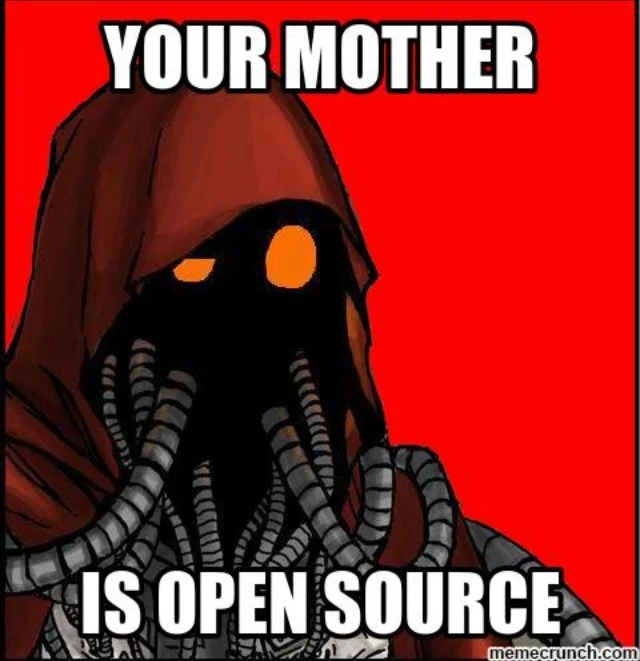And no, I’m not talking about pirating on the internet, I’m talking about getting your internet connection to the outside world without paying or having a subscription or license. Something like a mesh network with your neighbors with the exit node being one person’s high-speed fiber line, or even an exit node through a free public wifi network that you’ve hidden a little repeater device within range of… something like that could be interesting. I’ve been thinking lately of a world where decentralized networks become more common, and where people can freely use the internet without paying an ISP. What are your thoughts?
In Germany we have an initiative called Freifunk (roughly „Free Wireless Radio“). They are building free wifi mesh networks in larger cities. Their members use their ISP connection with special mesh network router software. The initiative collects donations to improve their infrastructure and fend off liability claims.
Edit: There has been a thread about Freifunk here already.
Back in the WEP/WPS days it was easy enough to use aircrack-ng and get access to a network. Anything public is likely to be slow and probably no access to open ports or manage it in any way.
I’m paying ~$45 CAD/month for a symmetrical 500Mbps line and I think its worth it. I’d never share this with anyone I don’t know because my name is on it, anything anyone does will come back to me.
I’d never share this with anyone I don’t know because my name is on it, anything anyone does will come back to me.
I’m the opposite. I keep no password on my wifi so I have plausible deniability
Just as s comment for someone else reading this: if this actually has a chance to protect you is highly dependant on your local laws. Even then, at least from my understanding, any lawsuit has to progress relatively far (involving lawyers to a significant degree) for this to become potentially relevant.
It would probably be safer legally to have a long range wifi and let users sign up for free, after agreeing to obey the laws. And then some kind of no-log or worthless-log policy.
Here that doesn’t change or help in any way. You’re the one on the contract for the Internet access, so you’re responsible. That’s it.
You can operate as an ISP, but the requirements and responsibilities that go with that make this a non-starter. From my (limited) understanding, it includes that if you can’t provide the identity of someone who is being sued (including piracy, but also any other law breaking), you’re responsible.
If you do that then you’re probably violating your ISPs TOS and they’d can you anyways, and if they really don’t like you sue for it.
Yeah, I used aircrack to gain access to one of my neighbors wifi and used it for about a month when I moved into my first apartment. After I got my own connection, I set up a guest network/SSID that was open,
access to open ports or manage it in any way
they usually leave the default passwords on their router management
Many many years ago in the paleolithic era when 2.4GHz was king, a neighbor in the next unit over had an unsecured wifi network… I connected my old laptop, figured out where the connection was best (turned out to be beside the stove in the kitchen?), piped the connection out the ethernet port and into the WAN port on my router, and set up my own “secured” network lol. I’m fairly certain anyone with a straight-up unsecured wifi network doesn’t have the skills or knowledge to detect someone leaching their bandwidth. I did that for like 3 years without a single hiccup until I moved and finally had to start paying.
Ah, yes, the WEP key passphrase era. I was a student then, and you could find me on the roof trying to get a stable signal to inject and capture data packets. Otherwise, no internet for me.
Or he believes in sharing his internet like the Freifunk People do.
Not everyone who is sharing something for free with you is a moron you’re taking advantage of. Pretty disgusting worldview
They said “pretty sure”, not certain. Statistically, they were right, until routers started shipping with “secured” wifi settings by default. Nowadays, its the reverse.
It wasn’t super relevant to the story, but yeah, I could just browse the files right on their PC, definitely a “Not intending to share it for free” kind of situation, completely devoid of any authentication or security.
First 6 months of marriage (first one, late 2010), we found an open wifi connection in our apartment complex and used that to our hearts content. This was when some people still didn’t understand why securing your wifi was necessary.
I miss the early days of WiFi, when routers were unsecured by default. If you lived in the city or suburbia, you were pretty much guaranteed free wifi.
Back in the 2000s I lived with my grandma for awhile, and even though she had internet, I would use the wifi from a few houses down. I only got 2 bars and was limited to 1.5Mbps, yet it was still over 5x faster than her 256Kbps DSL line.
Not pirated but my local cooperative ISP is offering to split the fiber connection with neighbors and give advice on how to do so.
We can even have two bills, two completely separated intense accesses on one fiber connection and they will split the bill in two, or three, or four (plus add a few euros for administrative fees)
About 10 years ago, I just moved and my new neighbor had an open network. Problem was they were 2 houses away and across the street. I set up a tiny repeater in my car with a battery pack and parked half way between us.
It worked surprising well for about 6 months.
Haha, awesome.
Hell, you could pickup a used car battery and have power for a week!
Yeah. Twenty years ago. I worked for two ISPs over the years. At both of them the test accounts for support to use were unmonitored accounts due to how many places they were used and logged in by. In both cases I simply put those login details into my home setup and got free internet for probably about three years. Before that some friends got a un/pw file from a university and decrypted a few hundred names and passwords for accounts which gave free dialup access to students. Again multiple logins seemed allowed so the only person losing was the uni/isp. Used to be able to pull about ~14gb a month through a dialup connection. Probably via napster, kazaa and soulseek, I can’t remember if torrents were a thing back then.
We shoulder-surfed a tech back in the 90s when he was getting us set up. Thus, the “HAHA FREE” dialup connection was born.
Gave years of service to our old beige box.
So, this was more common when WEP encryption was used. You could just listen to the radio traffic of the given network and collect IVs which the encryption would leak. Once you had enough pieces you could reassemble the key and access the network. When WPA came out it was harder, but tools like pyrit and john the ripper helped, so long as you were able to capture the 4-way TCP handshake.
To actually see the networks, you would build biquad parabolic antennas from old DirecTV dishes people left behind. They were very directional high gain antennas that you would just target at someone’s house. We’d also build cantennas from junk laying around. Those were interesting days.
lol I did that for a while when I was broke… for quite some time I rigged up my linksys router with wrt, set it up as a repeater for my neighbors wifi after cracking it.
Of course the real irony was after cracking it, I realized I could have cracked it much easier with a phone book (after realizing my local ISP, just used the persons phone number as the WEP key)
So here is what I do when I’m staying at my rented house near my college. I took a fiber connection from the ISP. But a friend of mine lives nearby he uses his landlords WiFi from the same ISP. From him I got the WiFi pass. And I discovered that that WiFi router uses admin1 as it’s admin password. So I got the ppoe username and password from it. The next month I didn’t paid the ISP bill so they suspended my internet connection. And put that ppoe username and password on my router. The ISP was calling me for two months to pay the bill but I didn’t. And somehow they stopped calling and I still have the fiber connection. It’s been over a year now and in still using it.
There is freifunk in Germany they use Mesh Network -> Router > VPN to another Country so they dont get Problems by People pirating.
A Freifunk map: https://www.freifunk-karte.de/
I just released the 6th patched router for friends to expand the network. In the area we use it its already available but using more router extends the range and network quality.
used GL.iNet GL-AR300M16-Ext routers btw
Wo kann ich da mehr drüber lernen? :3
Wait but the mesh network is virtual they don’t have their own antennas right?
They have their own antennas. If the internet connection of one router dies, but it has a connection to another Freifunk node, it gets routed over the other one.
That’s super cool, that sounds apocalypse-ready. It probably only exists in cities though, right?
It isn’t just deployed by nerds but sometimes also by cafes, libraries and municipalities. So you can expect them to be in every town but they don’t have such a dense coverage that they have a full mesh network over a city.
And the thing that is missing is that there are no inter network services like an copy of Wikipedia, LLMs or fileshares.
Here is a map of all access points in Hamburg, I preselected an acesspoint that has a large mesh network: https://map.hamburg.freifunk.net/#!v:m;n:d8473253afe8
15 years ago I went on a 3 month Semester at Sea study trip on a small cruise ship circumnavigating the globe.
There was only a handful of whitelisted sites available on the WiFi, otherwise you would need to pay a ton for the satellite connection or … have a staff password.
At least with my group we had a a healthy list of credentials that had been acquired in various ways. Even with occasional password changes, we managed to stay connected.
There are a few towns that became their own internet providers b/c the big guys wouldn’t bring them either any or adequate service and they realized they could do it themselves more cheaply. They had to fight anti-socialism propaganda and of course lobbying and disinformation campaigns from the big providers, despite the fact that they had no intention of ever going there.
way back in the early days of Wifi (802.11B was the cutting edge magic future technology) I had a large antenna hooked up to my laptop PCMCIA wifi card and could pick up some open networks from a few neighbours away. I used to set it up and leave winmx running on my laptop to download all sorts of garbage.
My home internet at the time was up-to 512Kbps satellite downlink (usually around 200k and lots of packet loss and very high ping) with a ~56k dial up uplink which was also the failover when the satellite was too weak, so it was very asymmetrical and unreliable.
This is semi-rural Australia in 1999/2000 and was the best we could get until we got a 3G connection that usually got 1.5meg down and 500k up on a weak HSPA connection, that place didn’t get 8/1 ADSL a couple of years later around 2005/6. A couple of streets away there were already on cable and better DSL lines were available so I assume I was connecting to one of those.
Over the weak long range Wifi connection with a makeshift “cantenna” that probably wasn’t quite right I usually got around 250k symmetrical if I recall correctly, which was really nice compared to the satellite link despite the lower maximum speed.
Once in WEP days, before smartphones. I was on vacation on this place without internet and I cracked someone’s wifi password to get internet. It was wild how easy was to crack Wi-Fi’s passwords.
I used to crack my neighbour’s WEP secured Wifi back in the day.
When our local internet provider (Telus) first distributed wifi routers around 2004, they didn’t turn on encryption by default. I think I made use of nodes in the “neighbour net” for about three years before the majority began setting up WEP.












